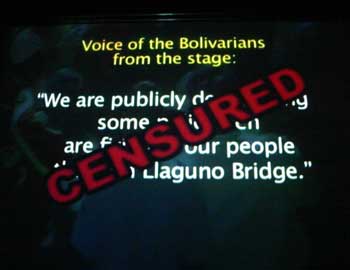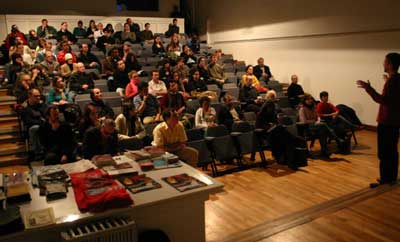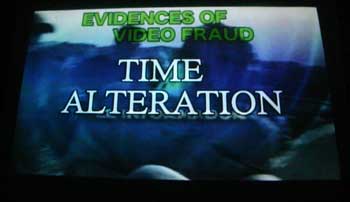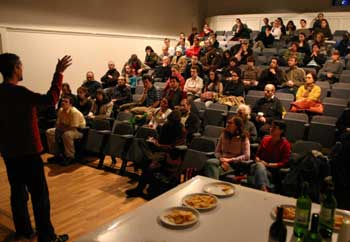London - Successful commemoration of the 18th anniversary of the “Caracazo”
- 01 March 2007
 February
27 marked the 18th anniversary of the popular uprising known as the Caracazo,
which took place in 1989 in Venezuela.
February
27 marked the 18th anniversary of the popular uprising known as the Caracazo,
which took place in 1989 in Venezuela.
The spontaneous movement of the mass of the Venezuelan poor (80% of the population lived below the poverty line at that time) was provoked by a sharp increase of all basic food, energy, fuel and transport prices by 200% as a consequence of a neo-liberal package deal introduced by the government of President Carlos Andrés Pérez. The massive movement, although lacking of any organised leadership, immediately took an insurrectionary character, threatening the very foundations of the capitalist system: private property.
The response of the supposedly democratic government was to call on the army to put down the mass uprising, opening fire on men, women and children in the streets and storming the poorest neighbourhoods of the main Venezuelan cities with bullets, particularly in the capital where hundreds of dead bodies were left laying in the streets.
According to the government "only" 276 people died in the attempt to "restore order". Soon afterwards, mass graves were discovered. It is now recognised that at least 3,000 people were killed, though some put the figure as high as 10,000.
 This
event marked the complete alienation of the mass of the Venezuelan people from
the so-called democratic regime of the Fourth Republic and sparked off what
became known later as the Bolivarian Revolution led by Hugo Chávez, which began
as a reaction of a section of young army officers repelled by the very idea
that the army could have slaughtered its own people.
This
event marked the complete alienation of the mass of the Venezuelan people from
the so-called democratic regime of the Fourth Republic and sparked off what
became known later as the Bolivarian Revolution led by Hugo Chávez, which began
as a reaction of a section of young army officers repelled by the very idea
that the army could have slaughtered its own people.
Knowledge of this massacre has been buried by the same international media that now hysterically call Chávez a dictator. In Venezuela, the whole of the private and state media consistently backed the government's version of events. Only the heroic work of a handful of independent journalists and media activists was finally able to reveal the real size and scope of the repression.
Hands Off Venezuela and Cine Urgente organised an important event in London on February 26 to commemorate the Caracazo and to discuss the role of capitalist media in society. The event was held in Bolivar Hall at the Venezuelan Embassy, thanks to the support of the Venezuelan Ambassador, Alfredo Toro Hardy.
 The
focus of the screenings and the debate was the strikingly similar role played
by the media in relation to the Caracazo and during the April 11, 2002
coup against Chávez. These events demonstrate that the capitalist media consistently
defend the interests of the ruling class whenever they are put at risk, no
matter who is in office at that particular moment in time.
The
focus of the screenings and the debate was the strikingly similar role played
by the media in relation to the Caracazo and during the April 11, 2002
coup against Chávez. These events demonstrate that the capitalist media consistently
defend the interests of the ruling class whenever they are put at risk, no
matter who is in office at that particular moment in time.
The event was opened by Pedro Laya, Venezuelan director and producer (Cine Urgente), who explained the important role played by the independent media in defending the truth and denouncing the official versions of events in both 1989 and 2002.
The opening speech was followed by the screening of a short video, cut by the HoV Media Centre, with original footage of the Caracazo.
Jorge Martin, international secretary of HoV, then provided the audience with an explanation of the real meaning of the Caracazo in the development of the Bolivarian Revolution and of the events that led to the April 2002 coup against Chávez.
The background information paved the way for the screening of the documentary "Llaguno Bridge - Keys to a Massacre". The documentary, produced by the Venezuelan National Association of Free, Community and Alternative Media, analyses and discloses the mechanism of the conspiracy that led to the April 11 coup. In particular it reveals the shameful record of the capitalist media, their key role in the coup plot and their instrumental use of the Llaguno Bridge massacre against the government.
On the first day of the coup, a mass opposition rally against Chávez had been called at the headquarters of the national oil company, PDVSA This rally was meant as demonstration against the government's decision to claim back state control of Venezuela's most important asset - PDVSA. The opposition leaders decided to march on the Presidential Palace. Soon afterwards, all the private TV channels in Venezuela were broadcasting images of Chávez supporters shooting from Llaguno Bridge into an unarmed opposition demonstration. These images were used as a pretext to launch the coup.
 The
imperialists, including the British government, welcomed the coup "to
restore the democratic government". In fact, the new president installed
briefly by the coup, Pedro Carmona Estanga, suspended the constitution and
dissolved every democratic institution in the country.
The
imperialists, including the British government, welcomed the coup "to
restore the democratic government". In fact, the new president installed
briefly by the coup, Pedro Carmona Estanga, suspended the constitution and
dissolved every democratic institution in the country.
It was only later that the truth came out. The killings at Puente Llaguno had been carefully planned by the coup plotters in order to justify their actions before international public opinion. They had organized these murders in advance.
More than 80 people attentively followed the whole event showing a great interest in the screenings. A lively session of debate and discussion followed the screenings with questions relating to the actual position and the perspectives of the Venezuelan Revolution after landslide victory of Chávez in the Presidential election on December 3.
Another issue highlighted in the debate was the decision taken by the Bolivarian government not to renew RCTV's broadcasting license, due to the role this TV station played in the coup. This move on the part of the government is not meant as a blow against "free press" but, on the contrary, as a means of giving the Venezuelan people broader and free access to the media.
The meeting ended in a general mood of enthusiasm and most of the participants showed keen interest in following up the activities of the Hands Off Venezuela Campaign.